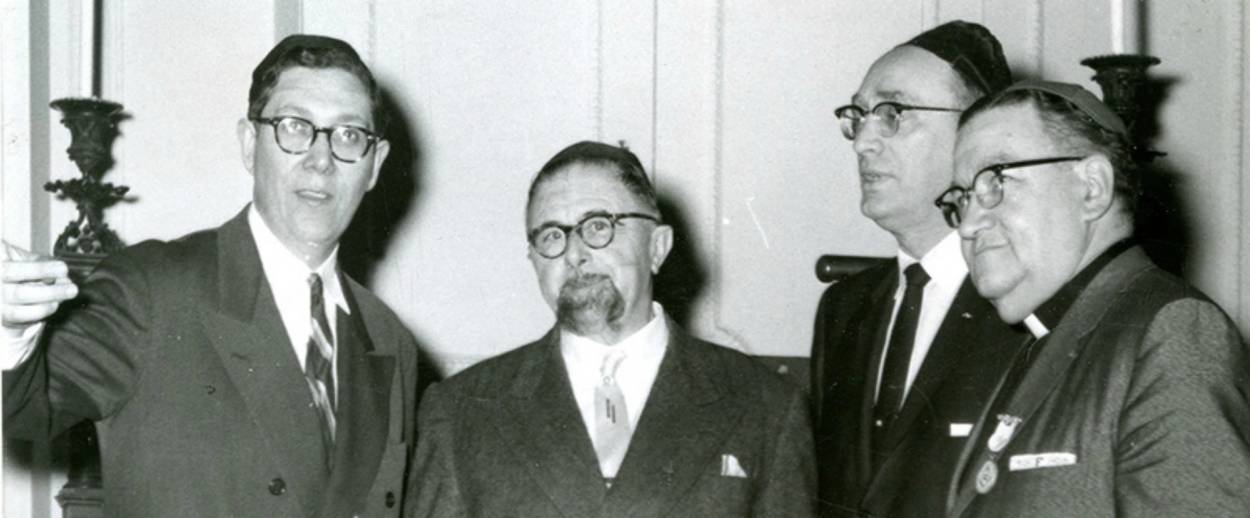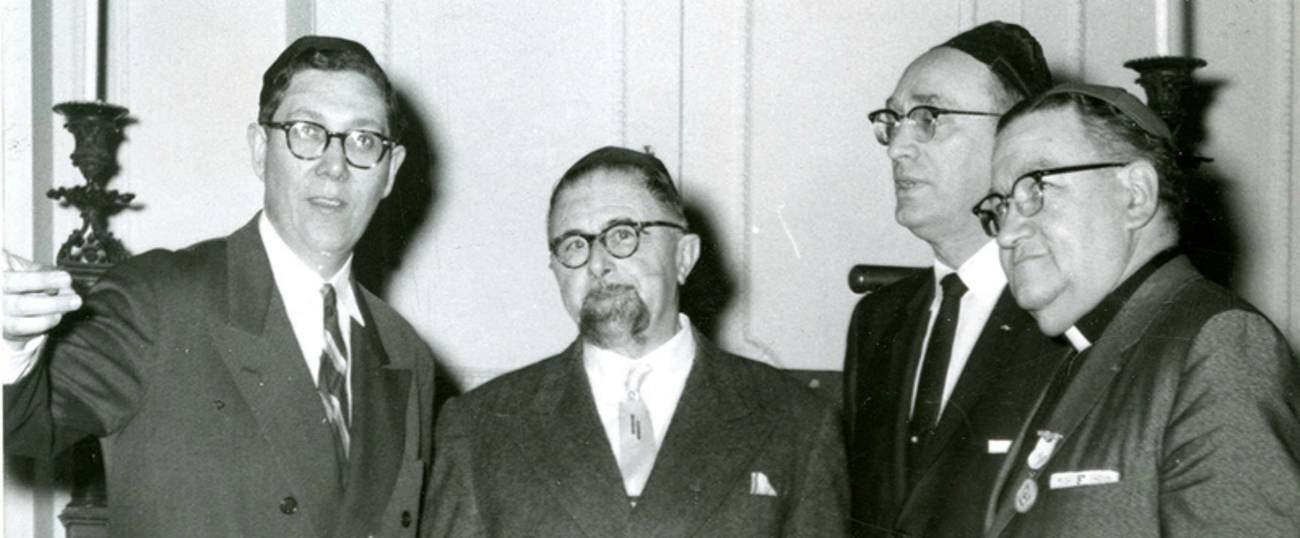When the Rabbi Told the Truth
Fifty-nine years ago, Rabbi Theodore Lewis of Newport went on one of TV’s most popular game shows. Hilarity and profundity ensued.




When Theodore Lewis—the Dublin-born Orthodox rabbi who served as spiritual leader of Newport, Rhode Island’s Touro Synagogue for 36 years, beginning in 1949—passed away in 2010 at age 95, obituaries from Colorado to Ireland noted that among other events in his storied life, he had once been a guest on an episode of the popular American television game show To Tell the Truth.
The episode, sponsored by the cigarette manufacturer Marlboro and hosted by Bud Collyer, aired on CBS on the evening of June 30, 1959. Its celebrity panel, comprised of Jayne Meadows, Don Ameche, Kitty Carlisle, and Tom Poston, was tasked with determining which of three guests—each wearing a suit and tie, sporting a large black yarmulke, and claiming to be Theodore Lewis—was in fact “the only Irish-born rabbi in the United States.”
Collyer read Lewis’ signed affidavit aloud: “I, Rabbi Theodore Lewis, was born and raised in Dublin, Ireland. I was formerly the rabbi of the largest synagogue in Ireland. I am now the rabbi of the oldest synagogue in the United States—Touro Synagogue, in Newport, Rhode Island. Our congregation was founded in 1658 and the present building was dedicated in 1763. George Washington visited Touro Synagogue in 1790 and President Eisenhower paid a visit last year. Touro Synagogue is designated a National Historic Site by the federal government. I originally came to this country to find out why so many Irishmen came to America. This month I became an American citizen.”
After asking the three men questions about the Bible, Israel, Judaism, Irish history, and New England geography, all four panelists correctly identified which of the three was “the real Rabbi Theodore Lewis.” One of the guests had incorrectly cited Deuteronomy, rather than Leviticus, as the third book in the Bible. Another had mistakenly stated that Abba Eban, rather than Golda Meir, was Israel’s foreign minister. All of the erudite Lewis’ answers, however, had been accurate.
Meadows explained her vote by noting that the man who turned out to be Lewis not only “knew where Fall River, Massachusetts, was,” but also had “the rosy glow to his cheeks that looked like he might have lived in the Irish Sea for a while.” Ameche explained his vote by suggesting that the man who turned out to be Lewis had “the only legitimate Irish accent in the group.”
When Collyer requested that “the real Rabbi Theodore Lewis please stand up,” the tall, thickset Lewis—beside whom the other two guests had seemed especially diminutive—rose, smiling bashfully. After he sat down once more, the pair of rabbinic-impostors flanking him revealed themselves to be Philip Colleck, a New York City antiques dealer and gallery owner, and Sidney Gross, an all-night disc jockey on a New York radio station who was popularly known as “the voice of the night” because of the horror and suspense stories he told.
The show’s sponsor, Marlboro, offered a $150 prize to the three participants, to be split evenly between them, as well as a carton of cigarettes for each one. Immensely proud of being Touro Synagogue’s rabbi and an indefatigable promoter of awareness about its history, Lewis used his television appearance to inform viewers of its restoration fund and announced that he would be donating his winnings to the synagogue.
“The Touro Synagogue is one of the finest examples of classical colonial architecture. Currently, we are embarking on a restoration program and we hope to finish the restoration of the synagogue in October,” he explained in his Irish brogue. “Our aim is to have $300,000, and this will be by public donation and subscription.”
Collyer wished the rabbi success in his fundraising efforts, thanked the three men for participating, and reminded them that, “On your way out, you’ll find a carton of Marlboro cigarettes for each of you.” It was not readily apparent if Lewis also intended to donate his tobacco prize to Touro Synagogue.
Shai Afsai is a writer living in Providence, Rhode Island. His work has been published in Anthropology Today, Journal of the American Revolution, Reading Religion, Reform Jewish Quarterly, and Shofar: An Interdisciplinary Journal of Jewish Studies. He is currently researching the life and works of Rabbi Theodore Lewis.